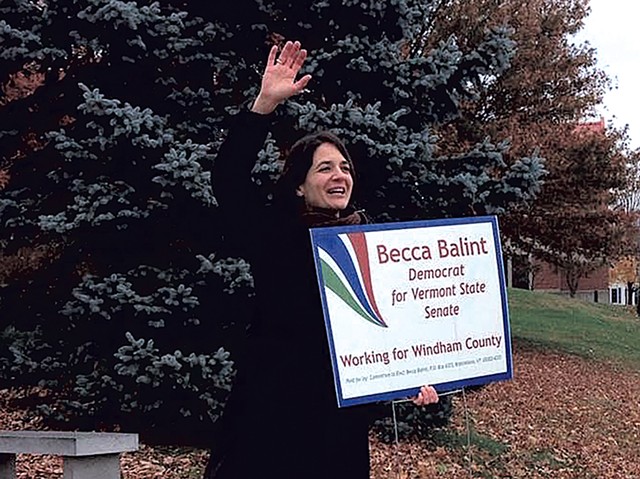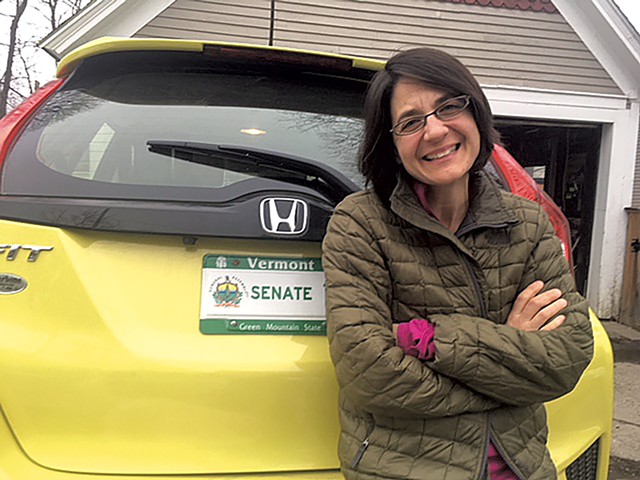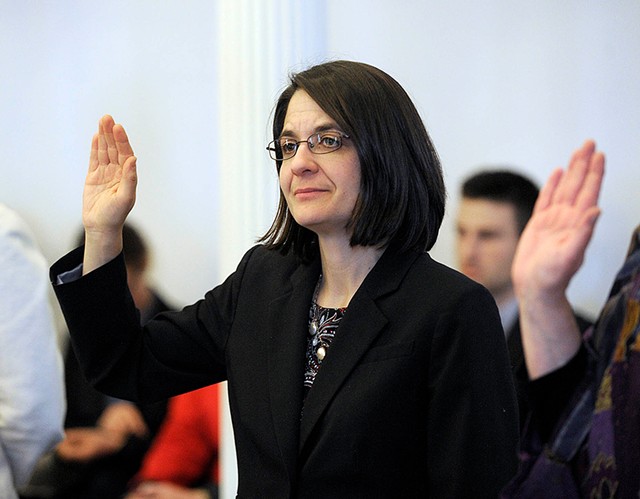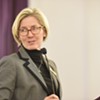Switch to the mobile version of this page.
Vermont's Independent Voice
- News
- Arts+Culture
- Home+Design
- Food
- Cannabis
- Music
- On Screen
- Events
- Jobs
- Obituaries
- Classifieds
- Personals
Browse News
Departments
Browse Arts + Culture
View All
local resources
Browse Food + Drink
View All
Browse Cannabis
View All
-
Culture

'Cannasations' Podcaster Kris Brown Aims to 'Humanize'…
-
True 802

A Burlington Cannabis Shop Plans to Host…
-
Business

Judge Tosses Burlington Cannabiz Owner's Lawsuit
-
Health + Fitness

Vermont's Cannabis Nurse Hotline Answers Health Questions…
-
Business

Waterbury Couple Buy Rare Vermont Cannabis License
Browse Music
View All
Browse On Screen
Browse Events
Browse Classifieds
Browse Personals
-

If you're looking for "I Spys," dating or LTRs, this is your scene.
View Profiles
Special Reports
Pubs+More
Woman on the Rise: Becca Balint's Ascent From Stay-at-Home Mom to Senate Majority Leader
Published February 21, 2018 at 10:00 a.m. | Updated December 23, 2018 at 1:56 p.m.
On the evening of August 26, 2014, as Peter and Sandra Balint waited to learn whether their daughter Becca would win her first-ever political contest, Liz Bankowski crossed a Brattleboro meeting room with something to say.
Bankowski, former chief of staff to Vermont's only woman governor and herself a senior stateswoman, had watched Becca Balint's campaign for the Vermont Senate and been impressed by her natural talent and skillful stumping.
"Someday she's going to be governor," Bankowski told the couple.
When the results came in that night, Balint had won one of two Democratic slots on the ballot to represent Windham County in the Vermont Senate. She finished a strong second in the November general election and headed to Montpelier, the first openly gay woman to serve in the Senate. After just two years, at the start of her second term, she was chosen as majority leader of the Democrat-dominated chamber.
The senator stands five feet tall and weighs a mere 98 pounds, but she has a large presence in the Statehouse, loudly cracking jokes, laughing and liberally dispensing hugs. She can't walk from one room to another without being waylaid by people who have questions to ask or simply want to chat. She's so busy she struggles to find time to eat. She showed up at a recent noon meeting with a bag of pretzels for lunch; another evening, she left the Statehouse exclaiming to no one in particular, "I need calories!"
In quick order, Balint, 49, has become a mentor to female candidates and a confidante to women who work in the capitol. This year, in the wake of the #MeToo movement, she has taken the lead in reforming the Senate's sexual harassment policy.
Liberal but pragmatic, with a particular interest in social justice and anti-poverty efforts, Balint has been a strong advocate for public schools and affordable housing.
After four years, Bankowski isn't alone in predicting big things for the junior senator. Though a future Democratic primary for any statewide office is likely to be a crowded and competitive affair, "I wouldn't count her out in any situation," Sen. Phil Baruth (D/P-Chittenden) said. "She walks into a room, and she walks out with all the votes."
'You Probably Won't Win'
click to enlarge 

- Courtesy Of Becca Balint
- Becca Balint (right) with wife Elizabeth Wohl and children Abraham and Sadie
Balint grew up in Peekskill, N.Y., the youngest of three children. Her Jewish grandfather was killed during the Holocaust, but her father survived, immigrating with his mother to the U.S. in 1957. He put himself through college, served in the U.S. Army and worked at a phone company. Balint's mother, who worked at a watch factory, later went on to get a college degree and, her daughter noted proudly, a black belt in kung fu.
"I always knew that I wanted to be in politics," Balint noted. "I knew also at [age] 11 that I was gay." She assumed the latter precluded the former, but that didn't stop her from staying informed. At 13, Balint subscribed to Ms. magazine.
She attributes her early interest in politics to growing up gay and female in a family affected by the Holocaust. In sixth grade, she confessed to having a crush on a classmate, and students started writing "lezzie" on her locker; she didn't formally come out until after high school.
Balint graduated with a bachelor's degree in women's studies and history from Smith College, where, as coxswain for the crew team, she earned the nickname "the Admiral." Calling out commands to the much larger rowers, she remembers herself as "this little Napoleon figure with her cup of coffee and her shaved head on the dock."
Balint insists her passion for the sport wasn't just about being the boss: "I loved this idea of being able to get eight really strong women to move together in harmony."
After college, in 1994, she got a job as a rock-climbing instructor at Farm & Wilderness, a Quaker-inspired summer camp in Plymouth. She taught middle school social studies but each summer returned to the camp where, in 2000, she met her future wife, a quiet carpenter from Wyoming named Elizabeth Wohl.
The two were joined in a civil union in 2004. They settled in Brattleboro in 2007 and wed two years later when Vermont legalized same-sex marriage.
While Wohl, who had graduated from Vermont Law School, was working to make partner at Downs Rachlin Martin, the couple decided Balint would stop teaching full time and stay home to care for their two young children, Abraham and Sadie.
"Those were hard years," said Balint, recalling her early forties. "I just got really quite down about my life and what I was doing ... I couldn't seem to shake this narrative that I was called to do this public work."
When Wohl suggested to her wife that she run for office, Balint said, her response was, "It's a terrible time."
"It's always going to be a terrible time — we're parents," Wohl replied. And, she added, "You probably won't win."
In 2013, Balint attended an intensive candidate boot camp at the Women's Campaign School at Yale University, and then entered the first class of Emerge Vermont, a program founded by former governor Madeleine Kunin to prepare Democratic women to run for office.
In June 2014, one month before she graduated from Emerge, Balint announced she was running for state Senate — challenging two Windham County incumbents in her own party: Peter Galbraith and Jeanette White. Galbraith was a zealous champion of campaign finance reform and a wind project opponent who frequently clashed with fellow senators, including White.
"I was concerned that some of the real concerns of my constituents back home were getting lost in the interpersonal drama," Balint said. In particular, she said, she was worried about growing poverty in the public school system, a dearth of affordable housing and the need for economic development.
Balint, who likes to hold meetings on the move, sought advice from Bankowski — Kunin's onetime chief of staff — on a mountain hike.
"It was a risky thing to do," Bankowski recalled of Balint's decision to challenge sitting senators. "A lot of people would not have gone into a campaign like that." At the same time, "It was very apparent to me how much talent she had and how ready she was ... There was nothing naïve about it or uninformed."
Galbraith unexpectedly announced in late June that he wouldn't seek reelection, but he endorsed a formidable Democratic candidate: Roger Allbee, a well-known former secretary of agriculture who was then CEO of Grace Cottage Hospital in Townshend.
Sen. Baruth, who was majority leader at the time, took the unusual step of endorsing Balint. "I heard there was a phenomenally talented woman from Windham County and that I should go meet her, and so I did, and I was about as impressed as you could be," Baruth said. "I found her highly charismatic and intelligent — everything you could want in a political candidate."
Balint triumphed in what became a four-way primary, finishing second to White, and then winning again in November.
"She's sort of a poster child for Emerge," Kunin said. "She jumped right in and has proven to be highly effective."
Ruth Hardy, the executive director of Emerge Vermont, believes Balint has succeeded in part because "she's just incredibly genuine and authentic.
"As we saw in the 2016 election, sometimes powerful women have a hard time being likable," Hardy continued, referring to Hillary Clinton's reputation for being rigid and unrelatable. Balint, Hardy noted, doesn't have that problem.
Showing Your Underbelly
As a first-term senator, Balint didn't spearhead any landmark bills, but she did forge unexpected friendships on two sleepy committees: Education and Institutions.
"She was delightful," said Sen. Peg Flory (R-Rutland), who chairs the latter.
Flory pointed to a drawing Balint sketched during testimony about cleaning up the state's polluted waterways, which the committee chair had tacked to a bulletin board. It depicts a helium balloon dropping cotton balls to absorb algae, milfoil-eating goats on a floating dock, a dragon, a hovercraft and Godzilla.
"You see what I mean about her sense of humor?" Flory said.
Artwork aside, Balint, who later switched from Institutions to Economic Development, took the work seriously. "She'd occasionally come in singing and bopping, but then, when it was time for work, it was buckle down," Flory said. She also praised Balint's ability to ask tough questions without causing offense. Paraphrasing a Winston Churchill quote, Flory said, "She could tell someone to go to hell in such a way that they looked forward to the trip."
Sen. Dick Mazza (D-Grand Isle), a Senate stalwart who serves on Institutions, warmed to Balint early on. "From day one, she always impressed me as being somebody who really wanted to be here, who was really interested in the Senate and respected the Senate for what it is," he said.
Balint quickly made connections outside the chamber, too.
During the four weekdays she spends in Montpelier, she shares a house with Vermont Supreme Court Justice Marilyn Skoglund, who supervised Wohl during her clerkship and later married the couple.
Balint has assembled an informal network of women who work in powerful positions across all three branches of government and beyond. She's been known to invite them over for gin and tonics on Skoglund's back porch to share the struggles of working in male-dominated arenas.
Unlike most of her Senate colleagues, Balint must juggle her legislative duties with a young family. She makes sure she's back in Brattleboro on Fridays in time to bake bread for the family's Shabbat meal and to spend as much time as she can with her kids, ages 10 and 7.
"I think it's stretched both of us for me to have this job," she said, referring to Wohl, who is now general counsel and chief compliance officer for the Brattleboro Retreat.
Balint has no problem talking openly about her personal life. She even offered to explain how she and Wohl conceived their two children. (A close friend volunteered to be the biological father.) The senator has also put her insecurities into print: In one of the weekly Brattleboro Reformer opinion columns that she's been writing for the past six years, Balint described a recurring nightmare she used to have about joining the Senate that "featured an anxious drive up to Montpelier only to discover that I had no place to stay."
She's savvy enough to recognize that her candor can be an advantage: "It's incredibly disarming when you show someone your underbelly."
Among the Statehouse press corps, she's developed a reputation as a politician who's willing to talk plainly and candidly. Last May, in the standoff leading up to Republican Gov. Phil Scott's budget veto, legislative leaders were tight-lipped as they held multiple closed-door meetings with the governor's team. Balint, though, was willing to talk to reporters off the record about the state of negotiations, offering insight into the sticking points and personal dynamics at play.
Earlier this month, as Balint sat on a couch just outside the Statehouse cafeteria talking with this reporter, she was interrupted every few minutes. A lobbyist handed her a report he wanted her to read. Rep. George Till (D-Jericho) complimented her on a speech about the minimum wage she'd delivered at a press conference earlier that day. Rep. Kate Webb (D-Shelburne) told her, "I wanna check in with you about what you did with pre-K today," referring to a bill in the Senate Education Committee.
When Rebecca Ramos, a lobbyist with Necrason Group, walked by, Balint called out, "Hey, baby."
"She's curious about people," Ramos, who has become one of Balint's closest friends and is part of her female crew, said later. "She is so interested in whoever is in front of her, [and] she gives you 100 percent of her attention ... That's why she is so beloved."
The Art of Gently Scolding
Balint described the night that Donald Trump won the presidency as "one of the most devastating evenings of my life."
Days later, she got together with a group of Windham County women to discuss how they could push back against Trump's agenda. Balint said that's when she began to consider running for majority leader as "a way to put more skin in the game."
It helped that she had several influential people nudging her to run, including Congressman Peter Welch (D-Vt.). "What I thought was quite special about her was a combination of intellect and empathy," Welch said. "I see Becca Balint as having the confidence and the goodness in her to really reach out to help ... others make the best possible contribution they can make, whether Republican or Democrat."
Sen. Mazza also supported her bid. "I thought she would be a good person to deal with a lot of different folks and get people united together on issues," he said.
Winning over the rest of the Senate Democrats didn't prove difficult. "People came to know her and trust her and like her in very short order," said Baruth, who encouraged Balint to take his place. Several other senators expressed interest in running for the post but, ultimately, none did.
As a relative newcomer to the Senate, Balint has had few conflicts so far. Even Statehouse Republicans interviewed for this story passed up the opportunity to criticize a Democrat. Baruth thinks being a "die-hard passionate advocate for economic development in rural parts of the state" has helped her make inroads with more conservative senators.
The majority leader's primary duty is to corral a diverse group of Democrats into a reasonably cohesive unit. That involves keeping tabs on any bill that's about to advance and knowing where party members stand on it. When tensions arise among the senators, it's the leader's job to quell them.
In the Senate, where Democrats hold 23 of the 30 seats, majority leader can be a bit part — someone who is left doing the Democratic president pro tempore's bidding. But Balint has made the role her own.
Her middle school teacher skills — the art of gently scolding, diffusing conflict and drawing out reticent participants — are on full display when the Senate Democrats meet each Tuesday to discuss upcoming legislation.
"She runs a tight ship, I'll tell ya," Mazza said. "I've seen caucuses go for an hour and a half and nothing gets done — not with Becca."
At a recent caucus, Balint scarfed down some communal Fritos before calling the meeting to order. On the agenda that day: a briefing from Sen. Jane Kitchel (D-Caledonia) on the governor's budget proposal.
As Kitchel spoke, Senate President Pro Tem Tim Ashe (D/P-Chittenden) and Sen. Claire Ayer (D-Addison) whispered to each other.
"I'm having a hard time hearing Jane because of the side conversations," Balint interjected. Then she gave the whisperers an admonishment that doubled as a compliment: "I imagine what you're saying is important for other people to hear."
The room quieted.
"I know how to make sure all voices are heard, and that was really a charge I was given by a lot of people in the caucus," Balint said later. "We are all elected as equals, and it doesn't necessarily play out this way in the building all the time."
She's taken an inclusive approach when working with Republicans, too. After the Senate Economic Development Committee voted to advance a bill to raise the minimum wage, Balint turned to the lone dissenter, Sen. David Soucy (R-Rutland). Thanking him for having been "totally engaged" throughout the bill review process, despite his objections, Balint proceeded to recruit him to serve as a judge at an upcoming ski jumping competition in Brattleboro.
The Whole Loaf
As majority leader, Balint has proven pragmatic. At that same committee meeting, Sen. Alison Clarkson (D-Windsor) argued for raising the minimum wage at a faster rate. Balint suggested such a bill might not make it through the Senate.
"We want to end up with something and not nothing, right? I don't want to end up with half a loaf," Balint said. "Like, I really don't want to end up with half a loaf ... and I think there's some danger of that." The version Balint backed passed the Senate 20-10 last week.
And though she's built a reputation based on openness, Balint has also shown a willingness to retreat behind closed doors to give her caucus members space to hash out their differences. Earlier this month, for example, Democratic senators left the Statehouse to meet privately in the basement of the Department of Taxes to discuss ways to more effectively counter the governor's political messaging. The legislature's lawyers maintain that such a practice is legal, though others dispute this.
Later, Balint defended the need for closed-door meetings. "We have so many personality conflicts in that chamber," she said. "I see the value not necessarily in talking about the merits of [a] bill, but of getting these very strong personalities together and being able to really talk to each other."
Balint is also learning to manage her own relationship with Ashe. Although her obligation to the caucus often dovetails with his role of overseeing the entire chamber, the two don't appear to be on gin-and-tonic terms.
"Certainly, personality-wise, we're very different, and I think that's something we're both still trying to figure out," Balint said. "I feel like in the last couple weeks things are jelling ... and some of that is me feeling more confident in my role."
Ashe was less forthcoming: "I've enjoyed working with Becca," he said. "I think the caucus has been running smoothly." And, "we're both continuing to learn every day."
As majority leader, Balint is expected to elevate the priorities of the caucus above her own, but she's finding ways to pursue both.
She volunteered last year to chair the Senate Sexual Harassment Panel, which made her the default spokeswoman during the national wave of harassment and assault allegations brought on by the #MeToo movement. As Seven Days and other outlets reported, stories of harassment had surfaced in the Vermont Senate, too.
Balint readily acknowledged that the Senate had work to do to make the Statehouse a more hospitable workplace. Women have come to her with complaints, she said, but haven't felt comfortable bringing them before a panel of senators, as the current process requires.
Under Balint's leadership, the group has been meeting regularly this session, working with the House Sexual Harassment Prevention Panel to create a single, stronger set of protections that offers more avenues for reporting misconduct.
"I know there are people who have been here a long time who feel like we don't have a problem, we never had a problem and nothing needs to change," Balint said.
"It's evidence of her character that she's willing to stand up to the institution," Baruth said.
She's pushing for other incremental changes.
In early February, Balint crisscrossed Brattleboro in her bright-yellow Honda Fit. She'd spent the morning talking with social service providers and then rushed off to meet with residents concerned about school consolidation. She barely had time to down a few bites of falafel before traveling slushy, slick roads to the town office, where she joined a local group called the Community Equity Collaborative that's trying to combat racial bias.
Some of the members wondered whether they should postpone an effort to get legislators to participate in a bias training session.
Balint, the only lawmaker present, urged them not to let up: "I don't think we can put it on hold."
Asked about these efforts, she said, "I don't want to shake up the institution. What I want to do is very deliberately but respectfully change culture over time."
Breaking Trail
Balint's most enduring contribution could be in the future makeup of the Senate, which is currently one-third female.
"She's very engaged. She speaks to all of our classes," said Hardy of Emerge, who suggested it's no coincidence that five of the 29 members of the current class hail from Balint's home district.
Sarah Levine, 24, was living in Washington, D.C., but looking for a way to move back to Windham County and get involved in local politics when her mother mailed her a Brattleboro Reformer column Balint had written about Emerge.
Now a member of the 2018 class, the Putney resident recalled a speech Balint gave to the group. "She talked about the power of vulnerability — that really rang true with me," Levine said. "I feel like politics has become this detached, out-of-touch entity, easy to hate and feel disconnected from."
"It's really through the power of her example that I've leaned into this," said Sara Coffey, another 2018 Emerge member who plans to run for office. "Even as busy as she is as a legislator, she makes time to support women."
In the last year, Emerge has seen a surge of women interesting in running.
"We've never had such good fortune before," Kunin said, and "in a strange way, we have to thank Donald Trump."
Hardy confirmed she's seen a threefold increase in applications, but that's brought its own challenges. "We are trying to figure out how to meet that demand and also to find seats for people," Hardy said.
She is hoping Balint's position as senator might open up soon: "I think it would be fabulous to have her run for federal office — Congress or Senate."
For the moment, the only running Balint is doing is the physical kind.
She starts each day with a 6 a.m. jaunt through Montpelier's hilly, wooded Hubbard Park. Yaktrax cleats fastened to her running shoes, she scampered through a foot of fresh snow on a recent zero-degree morning. She paused to point out a set of deer tracks in the darkness — it was the only creature that had broken trail ahead of her.
In deference to an inadequately dressed reporter, she turned around early. Back at Skoglund's kitchen table, the senator was characteristically forthright when asked about her political aspirations.
"Certainly there are a lot of women who are so deeply frustrated and angry about politics at the federal level, about Trump's election and about the fact that we've never had a woman in Congress from Vermont, the fact that we've only had one woman governor, and I know that," she said. "I feel that pressure.
"I think at some point I will be ready to run for some higher office," Balint added. But she'll stick to her own timeline: "I just have to see how life unfolds."
Disclosure: Tim Ashe is the domestic partner of Seven Days publisher and coeditor Paula Routly.
Related Stories
Got something to say?
Send a letter to the editor
and we'll publish your feedback in print!
More By This Author
About The Author

Alicia Freese
Bio:
Alicia Freese was a Seven Days staff writer from 2014 through 2018.
Alicia Freese was a Seven Days staff writer from 2014 through 2018.
About the Artist

Matthew Thorsen
Bio:
Matthew Thorsen was a photographer for Seven Days 1995-2018. Read all about his life and work here.
Matthew Thorsen was a photographer for Seven Days 1995-2018. Read all about his life and work here.
Speaking of...
-

Dick Mazza Steps Down From Vermont Senate
Apr 8, 2024 -

Backstory: A Very Weird Week on Capitol Hill With Rookie Rep. Becca Balint
Dec 27, 2023 -

Rep. Balint Reverses Course, Calls for Cease-Fire in Gaza
Nov 16, 2023 -

Protesters Disrupt Balint Fundraiser to Demand Cease-Fire in Gaza
Nov 9, 2023 -

Texts Reveal Why Crypto Exec Backed Balint Over Gray in U.S. House Race
Oct 18, 2023 - More »
Comments (8)
Showing 1-8 of 8
Comments are closed.
From 2014-2020, Seven Days allowed readers to comment on all stories posted on our website. While we've appreciated the suggestions and insights, right now Seven Days is prioritizing our core mission — producing high-quality, responsible local journalism — over moderating online debates between readers.
To criticize, correct or praise our reporting, please send us a letter to the editor or send us a tip. We’ll check it out and report the results.
Online comments may return when we have better tech tools for managing them. Thanks for reading.
- 1. Vermont Senate Votes Down Ed Secretary Nominee Zoie Saunders Education
- 2. Governor Makes Last-Minute Appeal to Delay Vote on Ed Secretary Nominee Education
- 3. UVM, Middlebury College Students Set Up Encampments to Protest War in Gaza News
- 4. Dog Hiking Challenge Pushes Humans to Explore Vermont With Their Pups True 802
- 5. Scott Official Pushes Back on Former State Board of Ed Chair's Testimony Education
- 6. Help Seven Days Report on Rural Vermont 7D Promo
- 7. Burlington Budget Deficit Balloons to $13.1 Million News
- 1. Totally Transfixed: A Rare Eclipse on a Bluebird Day Dazzled Crowds in Northern Vermont 2024 Solar Eclipse
- 2. Zoie Saunders, Gov. Scott’s Pick for Education Secretary, Faces Questions About Her Qualifications Education
- 3. Don't Trash Those Solar Eclipse Glasses! Groups Collect Them to Be Reused 2024 Solar Eclipse
- 4. State Will Build Secure Juvenile Treatment Center in Vergennes News
- 5. Vermont Awarded $62 Million in Federal Solar Incentives News
- 6. Queen of the City: Mulvaney-Stanak Sworn In as Burlington Mayor News
- 7. New Jersey Earthquake Is Felt in Vermont News
















































